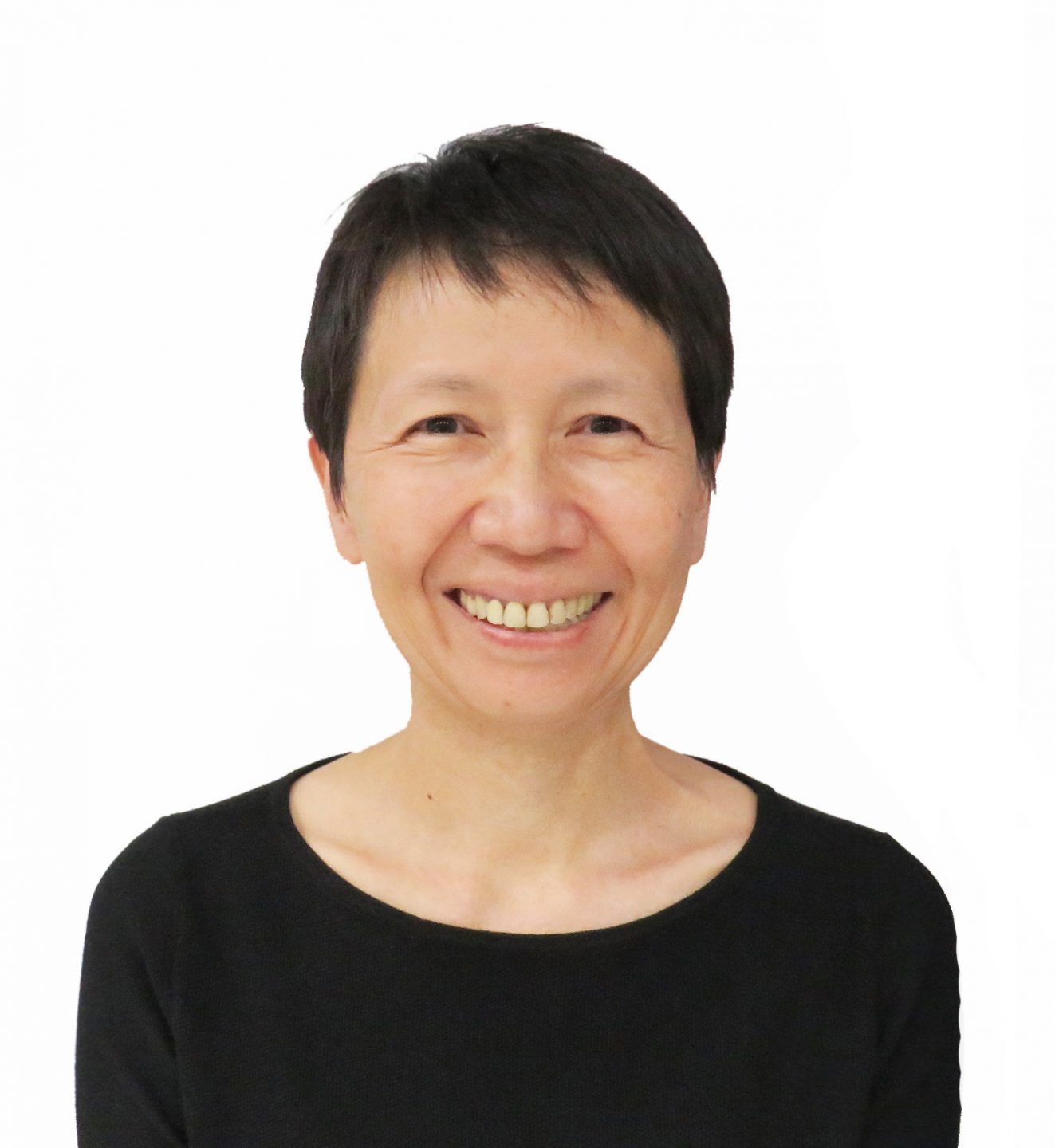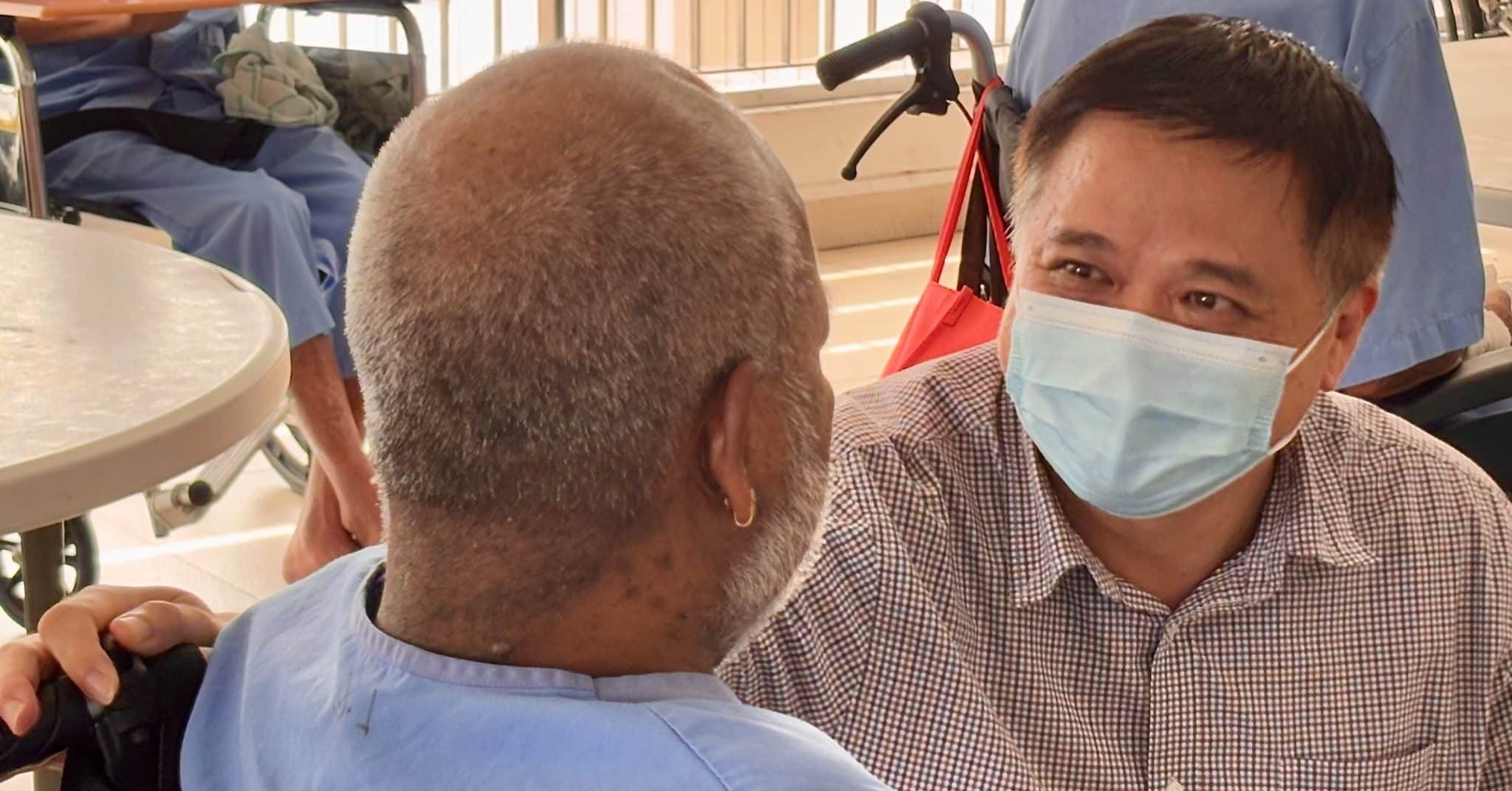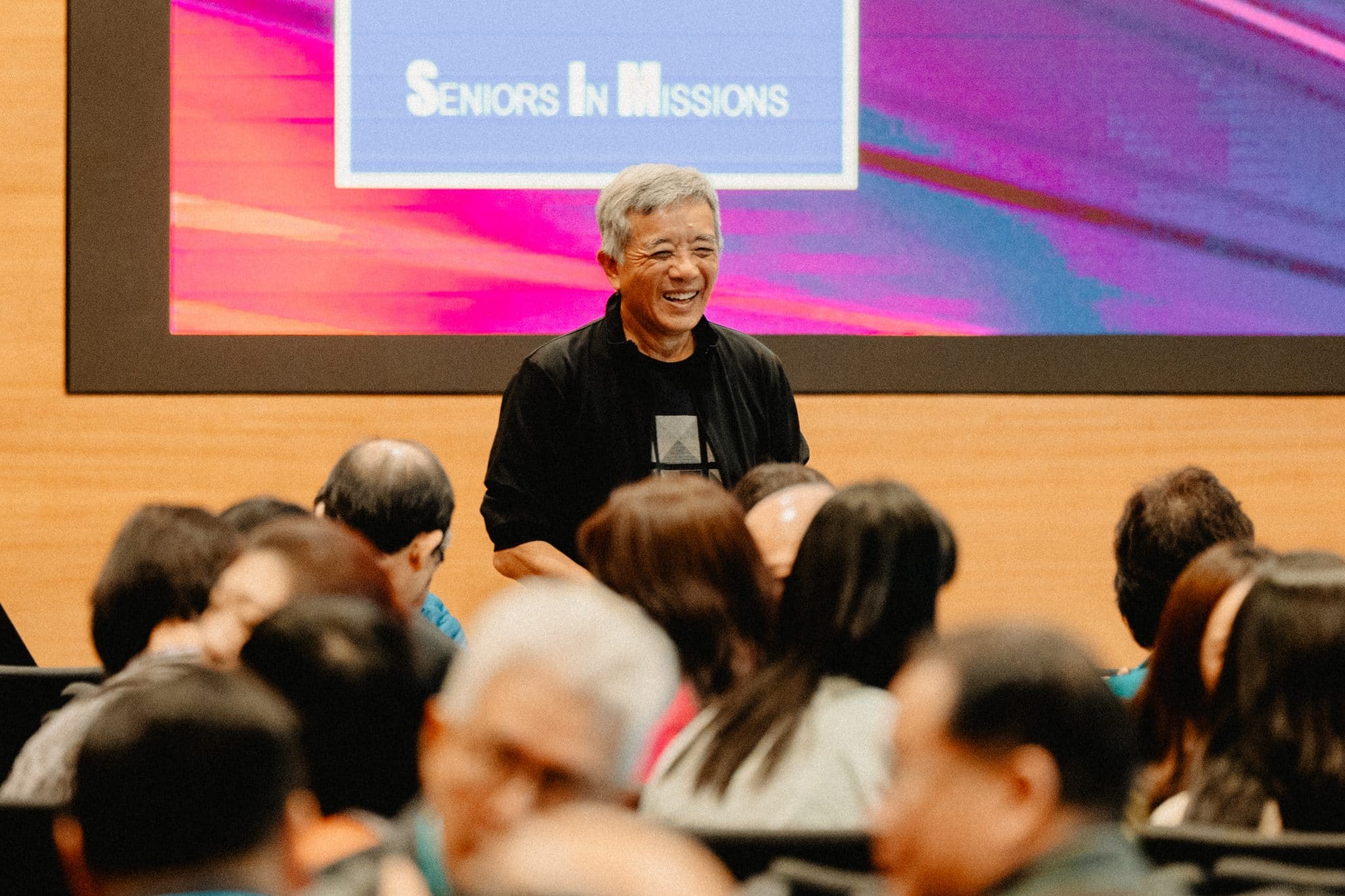Unprecedented suicide rate among S’pore’s aged: Are we failing our elderly?
Emilyn Tan // April 17, 2019, 6:21 pm
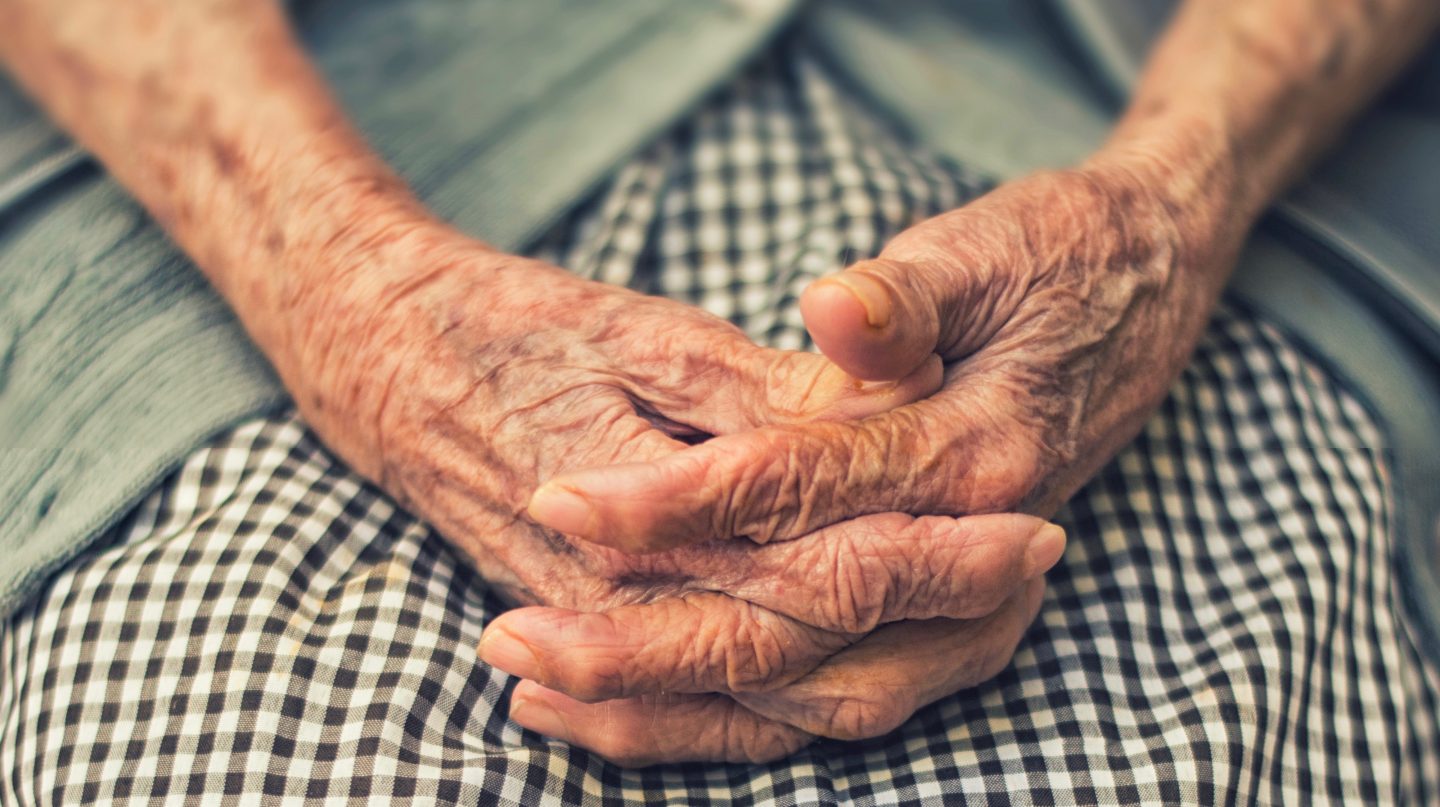
Photo by Cristian Newman on Unsplash.
“Eldercare”, the word, has a tender ring to it. The lived-out reality is not always so.
Issues of declining health and wellness aside, large numbers of our elderly feel keenly the lack of holistic care (whether real or imagined) and are lonely to the point of despair.
According to a Samaritans of Singapore (SOS) report released last July, 129 people aged 60 and above took their own lives in 2017, out of 361 overall.
God has given us the solution to helplessness, purposelessness, hopelessness, which are key issues that seniors face.
Not since record-keeping began has this segment represented the largest percentage of all reported suicides.
Then-SOS executive director Christine Wong registered her concern in saying: “It is very worrying that many elderly are turning to suicide as the only choice to end their pain and struggles, when they should be enjoying the lustre of their golden years.”
The larger worry is that this number could balloon, since this group of citizens is projected to grow to 900,000 by 2030.
Currently, our population stands at 5.6 million. Of these, slightly more than half a million are aged 65 and above.
The Singapore Government has stepped up its initiatives on behalf of the Pioneer and Merdeka Generations with benefit packages, besides the longstanding Central Provident Fund and Silver Support Schemes. The number of senior activity centres and the availability of beds in nursing homes have also been increased.
All these help to facilitate the function of life – the work of engaging hearts is a different matter altogether.
Pastoral care being the purview of the church community, are we helping to bring significance to our seniors’ definitions of “who am I”, “what am I here for”, “where am I going”, now that their context is old age and death?
Grim reapings
The question is put to Isaiah Chng, Chairman of Empower Ageing, a charity in support of ageing well, and founder/director of ProAge, a social enterprise that specialises in customised programmes aimed at improving the quality of life of seniors.
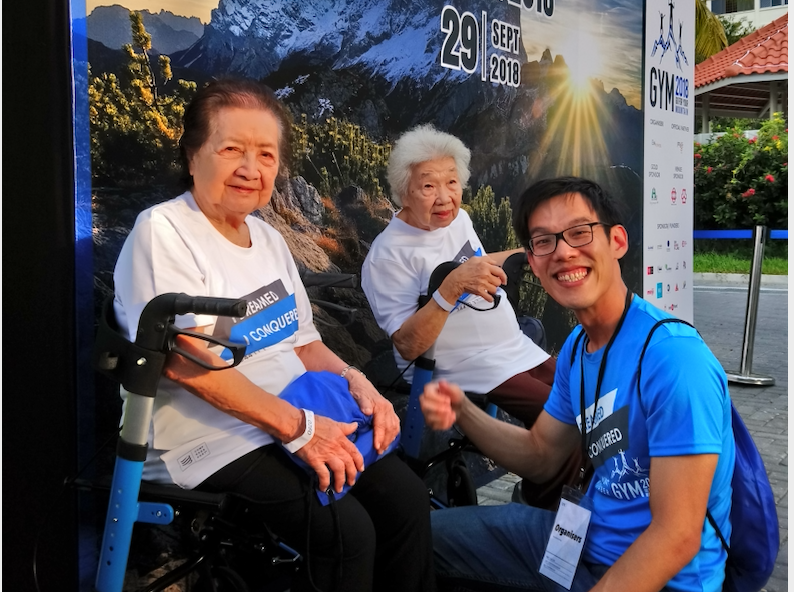
Thumbs up for seniors: “Old people live to tell the world, their family, everyone, that God is upright and He is righteous. All the way, throughout their life, He is righteous,” says Empower Ageing’s Isaiah Chng. Photo by Emilyn Tan.
He is measured in his response: “Society, I think, is trying to catch up. The government is doing a lot of things rather more positive, whereas church is a bit slower, I would think.”
Recalling a Whole Life Symposium he attended in 2016, Chng describes being in a discussion on seniors that was attended by some 30 pastors. When asked how many of their churches had a ministry to seniors, only a few put up their hands.
“God has spoken to me that He is going to raise a whole army of Calebs that will go for their mountains.”
“Some didn’t even have seniors’ ministries. The interesting thing was that at least half of their congregations were above 50.”
When asked how many want to reach out to seniors? “Many put up their hands!
“That means there’s an awareness that there is a need in the community and they want to do something about it.
“But most of them said, ‘We do not know how and where to start.’ In a sense, we are not really ready,” he concludes.
Nonetheless, he is adamant that the way forward is paved. “God has already given us the solution to helplessness, to purposelessness, to hopelessness, which are the key issues that seniors today face.
“God says: ‘Old men shall dream dreams’ (Joel 2:28).
“Dreaming is the solution to these issues. When you dream – if you dream – you can wake up every day with a purpose. When you have purpose, then you can have meaning in life.”
This is easily stated if doubt is cast aside. Reality paints a different picture: Can someone who is helpless, purposeless and hopeless even begin to dream?
Chng shakes his head somewhat ruefully, his smile bearing a hint of resignation as he collects his thoughts. The beginnings of his ongoing conversation with God on the matter were mired in a similar feebleness, until he realised the dream was, and remains, God’s purpose. (Isaiah 55:11)
He responds: “God has spoken to me that He is going to raise a whole army of Calebs that will go for their mountains.” (Joshua 14:6-15:14)
Uphill climb
The faith to believe that sort of a rhema* word is hard to come by, particularly when the sights to behold tell a dire story. (2 Corinthians 5:7)
The burden to transform the lives of the elderly has been Chng’s blessing for 12 years. He began in 2007 by visiting nursing homes with his church, Cornerstone Community Church, as a volunteer.
Walking the road tentatively at first, he soon found he was slip-sliding into God’s own bleeding heart for them. “God gave me a love for older people,” the now-35-year-old says quietly. “I want to love them. I want to help them.”
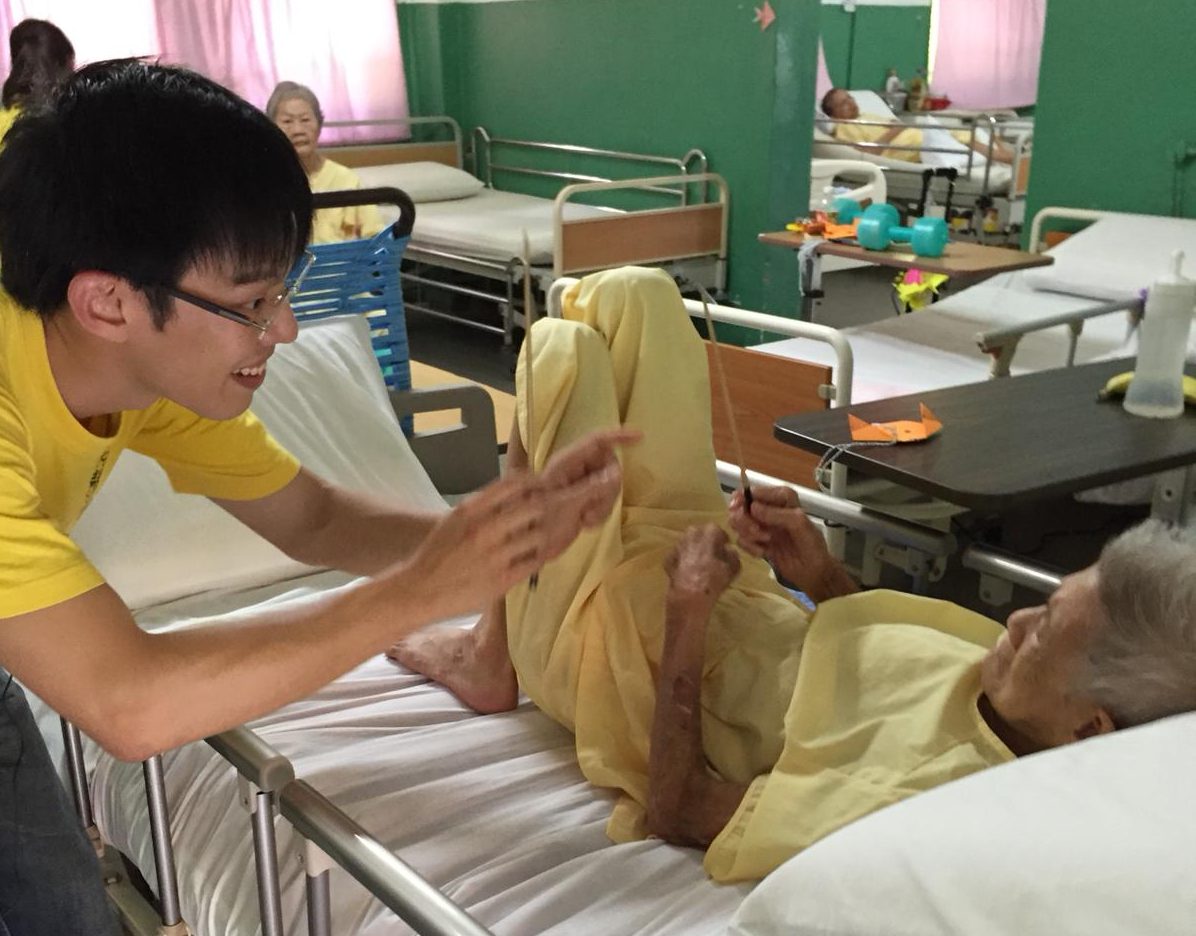
“God gave me a love for older people,” says Isaiah Chng, who began visiting nursing homes regularly in 2007 as a volunteer befriender. Photo courtesy of Isaiah Chng.
Fast-forward to October 2017, and he was on one of his usual rounds of volunteering and befriending at a nursing home.
An “uncle” was just lying in his bed – at first glance, much like any other patient. “I could see that he was frail. It was not like paralysis, not like a totally vegetative state.”
“When you dream, you can wake up every day with a purpose. When you have purpose, you have meaning in life.”
In the blink of an eye, Chng, a graduate in exercise science, saw another sight. “I could see that If you gave me time, I would be able to get him to walk again.” The Spirit had laid hold of Chng, who realised: “He was captive.” (Isaiah 61:1)
“I said to him, ‘Uncle, how’s your day?’ He was like, ‘I’m no use. I’d rather die.’ Then I asked him, ‘Why do you say that?’ He said, ‘活有什么用?’ (‘What’s the use of living?’)
“That’s something very common among the aged, but on that day, it struck me so deep. It just arose in me such a holy anger, like a zeal: I don’t want to see this happen again.”
Back at home, Chng became “really very depressed”. This was not the first personification of helplessness and hopelessness he had seen, and it wouldn’t be the last.
“Indignation was in my heart. Why, why, why? How can we go on like this? We can have the best services but if the old have this kind of attitude and mindset, in a sense there’s no hope.”
Hope springs eternal
The raw truth of what his eyes had seen was that seniors are largely poor in every dimension of wellness. “Emotionally, they are poor. Socially, they are poor. Physically, they have ailments. Mentally, they are all declining – they have dementia, they have depression.
“I asked God, ‘Why, why, why? Why make us grow old?’ ”
Referencing Psalm 92:12-15, God instructed Chng that old people are to be “a declaration” for Him by being fruitful, by flourishing, and by exuding freshness.
“The world can say, ‘Hey, where your God? What is this disease He’s stricken you with?’
“But if old people stand and declare, by the testimony of their lives, that my God is always upright, He’s always righteous – if that is fulfilled, you will see a whole army of Calebs arise and show that God makes a difference in life.
“There is a stark, complete difference – like light and darkness. That’s the whole point.”
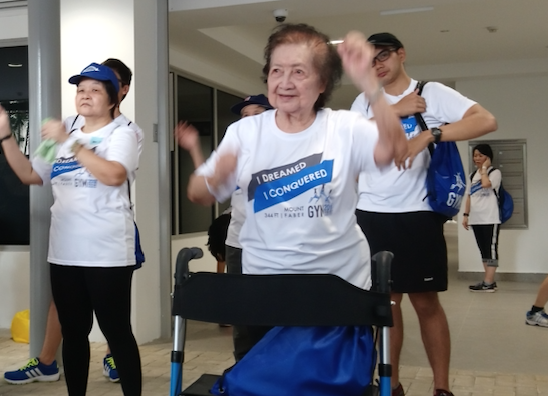
Chng came up with the Go for Your Mountain (GYM) walk after his encounter with “the uncle” in the nursing home in 2017. He says: “I don’t believe in maintenance. For physical conditioning, we always want to see how we can reverse, how we can restore and enable people. That’s why our name: Empower Ageing.” Photo by Emilyn Tan.
Expounding on the analogies, Chng notes that the palm tree is evergreen, fruitful and sturdy; everything about it can be put to use. Cedar logs are prized, and in Old Testament times were used to build Solomon’s temple. (1 Kings 6:9-10, 14)
“God says, ‘This is what I see of you when you grow older.’ The cedar tree still has leaves in winter time. God is saying that, like winter, old age can be cold, dreary; you may have depression.
“But, like the cedar tree, you are still to stand tall, stand majestic, be evergreen – fresh and still flourishing, still fruitful, no matter the season of your life.”
The scourge of ageism
That’s not how society views the aged. Rather, seniors are brushed aside as being past their prime and living, perhaps, on borrowed time.
Chng dismisses that as “a lie that says they are useless, they are weak, they just need to be occupied”.
He makes the comparison to children, whose potential is affirmed with enrichment programmes and encouragement. “We don’t do that for old people, but we should, because in the eyes of God, they are still children. Your status as a child of God doesn’t change just because you are 90.”
“Your status as a child of God doesn’t change just because you are 90.”
The revelation so grips him that he has made “Rethinking Ageing” a subject he is always ready to speak on.
“On one hand, God has revealed to me that there’s so much promise, so much hope. And yet this (debilitation) is where the reality is right now.
“I cried out to God, and God said, go and read about Caleb again.”
Chng thought he knew the story, but studying it anew, he saw that Caleb had a dream which he held tenaciously onto – a vision of the promise God had given about the land that was to be his (Numbers 14:24, Joshua 14:9-12).
“He just remembered that, and that gave him purpose to live on for the next 40 years (in the wilderness). I believe that not only did he keep himself spiritually strong, physically he kept himself strong as well (Joshua 14:11).
“And God reserved the giants for an old man to go and pick a fight with (Joshua 15:14). The very thing that the Israelites cowered away from, He used Caleb, an old man, to take.”
The example of Caleb has led Chng to four fundamentals to counter ageism and, in so doing, shore up the fight against elderly loneliness and suicide:
1. Accurate worldview: Perceive how God sees old age and old people
“If we change our perception of old people, then how we treat them, how we talk to them, will shift. Once we have that piece in place, everything else will change.”
He contends, for instance, that due to the bias of ageism, senior activity centres are built “to occupy their time”. An activity could involve beads, which the seniors are asked to sort by colour or shape.
In stark contrast is the same box of beads given to children. “You give them beads plus many other things, so that they can take their work back and show their parents.
“Why can’t old people do something they can take back and show their family? Purpose can be given to them.”
2. Intrinsic value: Recognise the potential of older individuals
“Old people are still made in the image of God (Genesis 1:26), no matter whether they have dementia, cancer; whether poor or rich – whatever. How God sees them doesn’t change. The heart of the Father (towards them) doesn’t change.”
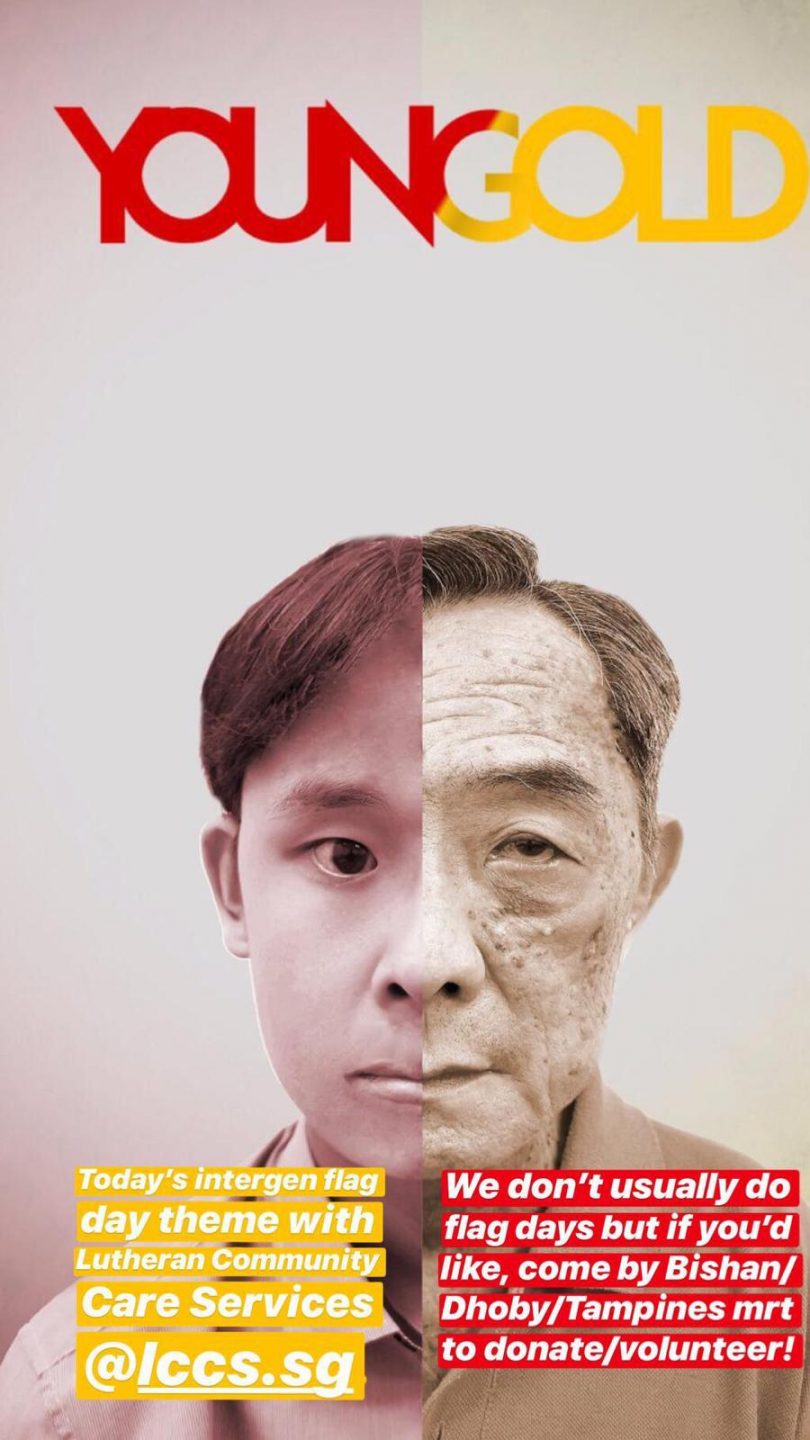
To raise awareness as well as funds, Empower Ageing partnered the Lutheran Community Care Services for a ‘Connecting the Young and Gold’ flag day on April 13, 2019. Photo courtesy of Isaiah Chng.
3. Intergenerational relationships: Invest in this
To enable the older generation to live well on a daily basis would ideally involve intergenerational relationships, given that Caleb took his mountain with an army that included his nephew (Joshua 15:17). Subsequently, Caleb shared his inheritance liberally (Joshua 15:18).
“The heart of the father, the patriarch, is for his family, not only for himself,” Chng notes. “The key is that when he fulfils his destiny, his family gets the benefits.
“It is a spiritual mandate: Authority is really given to old people. In God’s eyes, that doesn’t ever change.”
“This involves a partnership that is not always easy to foster. Oftentimes, as younger people, we kill the dreams of older people. We say, ‘Too old already, it’s not possible anymore.’ ”
That’s a modern-day mindset Chng seeks to change based on the Biblical principle of honour.
“It’s about a culture shift, going into the details about the family unit, bringing back how older people feel about themselves, with respect to their position in the family, and restoring that order.
“When God addressed the families and the tribes, (the patriarchs) were just called ‘the elders’. They came and represented their families, getting instruction and then going back to lead their families.
“That’s not something older people carry right now. But it is a spiritual mandate: Authority is given to old people. In God’s eyes, that doesn’t ever change.”
4. Finishing well: Encourage them to reach for a glorious end
Using the analogy of a marathon, Chng likens old age to approaching the finishing line. “You have a whole big crowd, media and everything. Cross the finishing line and you get praise, you are given a prize.
“Family members are the first ones to encourage your older ones towards the glorious finishing line.”
“We ask ourselves in church, even in society: Do we cheer them, affirm them, encourage and celebrate when they cross the finishing line?
“No. They just basically fade away. I want family members to understand you are the first ones to encourage your older ones towards the glorious finishing line.”
Compared to the fanfare at the start of life’s marathon when a baby is born, “the older person knows – he’s cognitively there, he’s emotionally there. All the more, we need this hype for them, so that they really will push to the finishing line and really cross it, no matter what state they are in.
“Actually, it doesn’t really matter what state you are in. As long as you hit your destination, you walk in your promises. You know you can bank on His promise, His hope. And you cross the finishing line. That’s all that’s needed.”
*word of knowledge; Greek for “utterance”
We are an independent, non-profit organisation that relies on the generosity of our readers, such as yourself, to continue serving the kingdom. Every dollar donated goes directly back into our editorial coverage.
Would you consider partnering with us in our kingdom work by supporting us financially, either as a one-off donation, or a recurring pledge?
Support Salt&Light